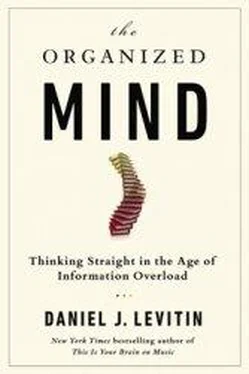On the other hand, if you think of something that you could do right away – such as calling your aunt to say happy birthday – then don’t think twice, do it immediately. Think of it in terms of the two-minute rule: If the task takes longer than two minutes to complete, then write it down. Otherwise, do it straight away.
Another effective approach is to organize your written thoughts into categories. This mirrors the way our brains are constantly categorizing new stimuli and helps simplify our thinking, thus saving time and increasing our attention capacity.
For example, if we see a flying object with feathers, our brain recognizes it as part of the category “bird.” Though this bird might be a hawk or an eagle, it’s easier to place it in this broader category rather than identify it specifically.
The same goes for our flash cards – collect them together and sort them into different groups according to the topics they relate to. These could be categories such as “Personal Life,” “Work” or “Kids.”
This way you’ll be able to keep your thoughts and ideas organized and accessible.
Junk drawers for miscellaneous items are incredibly effective – use them every day.
We’ve seen how creating categories is a great way to organize our thoughts and our lives. But what should we do with objects and ideas that don’t seem to belong in any pigeonhole? Well, these miscellaneous items can form their own category.
The categorizing tendencies of the brain can be seen in the way that we organize our living spaces. In our homes, there’s usually at least one place where random objects like single light bulbs, paper clips or car-cleaning products go. Why? Because it wouldn’t make sense to have a special drawer for light bulbs if you only had a few – combining them with other spare objects is much more space efficient.
You could even use one of these junk drawers at work. A miscellaneous folder, perhaps, containing documents that don’t fit into other folders but are also too important to dispose of. However, junk drawers will only be effective if we perform a little bit of maintenance from time to time.
The first way to do this is to keep checking their content regularly. This stops us losing track of what’s in there, which would reduce its organizational advantage. Some items can be eliminated from a junk drawer – if you’re sorting through objects that you haven’t yet felt the need to use, it’s unlikely that you’ll need them in the future. These can be thrown out.
You may also find that items in junk drawers can be moved to other places for more specific types of objects later. For example, perhaps you’ve recently developed an interest in scrapbooking. If you go through your junk drawer, you’ll almost certainly discover objects that could find a new home in the scrapbooking drawer – that extra pair of scissors, maybe, or the double-sided sticky tape.
Set aside time to refuel so you can increase your productivity later .
Everyone knows that you tend to be far more productive after a good night’s sleep. And yet, we’re often tempted to skip a few hours of kip in order to work just a little bit more.
This, however, is a mistake. Our brain works incredibly hard while we sleep, processing new information from the day and integrating it into our existing knowledge. Memories, problems and ideas often appear in our dreams and we may find ourselves better positioned to solve a problem after “sleeping on it.”
This phenomenon is backed up by studies. Researchers found that students attempting to solve a problem performed better following a night of sleep than a night spent awake. Ultimately, you’re twice as likely to solve a problem after you’ve slept on it. This shows that sleep is essential, and attempting to work when you’re tired is counterproductive.
Sleep isn’t the only way that we can refuel our minds. Many companies have discovered the benefits of decreasing their employees’ working time and providing designated “rest hours.”
One such company is Microsoft, where employees at the campus are welcome to use the in-house spa. This reflects Microsoft’s understanding of the need to refuel – workers found they were much more productive after relaxing there.
The accounting firm Ernst & Young improved worker performance by allowing additional vacation time. By supplying their employees with ten extra hours of vacation, they increased productivity by eight percent.
It’s important to think about the worst-case scenario so you’re always prepared.
Imagine this: You’re on vacation and have just found out that the airline has lost your luggage.
How would you react? Of course it’s good to be optimistic – perhaps they’ll find your bag! But it’s better still to be prepared. Good thing you brought that extra toothbrush!
Each time you plan something, you should consider all the things that could go wrong and think of a solution to them before they occur. Planning for failure in this way needn’t be difficult – it’s as straightforward as placing an extra key under the flowerpot by your front door.
A plan B is especially important in business situations. It’s true that sometimes things just happen. You forget an important appointment, or you lose the contact details of someone you need to speak to.
But, if you plan your time ahead, these mistakes will be less likely. With the assistance of an electronic calendar, either on your phone, computer, or both, you can ensure you’ll never forget about meetings again.
A plan B at work can also include keeping an extra shirt in your office, in case you accidentally spill your coffee before an important appointment with your boss!
It’s also important that we don’t rely on technology alone to prevent us from slipping up. Phones, computers and other technical devices aren’t perfect and at some point will let us down without warning. This is why you should also prepare non-technical solutions as a backup.
This is something that your taxi driver does. They always keep a plastic credit card press in their car in case their electronic credit card machines doesn’t work. This way, they can ensure they don’t lose any fares due to technical failure.
We can’t know the answer to every question, but we can know where and how to find it!
Today, we lead very different lives to our grandparents. One of the greatest changes is the way we can easily access vast amounts of information in no time at all. Googling something takes less than a minute! Nevertheless, there’s one important question we should continually ask ourselves: Is this information reliable?
Many of us have used Wikipedia before. The information it can provide us on a wide range of topics is hugely helpful, but is subject to a major drawback. Anyone is able to edit the information on a Wikipedia page, so we can never immediately be sure whether it is reliable. This means we should take the time to verify the information.
In order to evaluate whether a website is a valuable source or not, we can first investigate whether any reliable websites, such as established news services or government websites link to the website. If so, the site itself is likely to be reliable, and information can also be verified by cross-checking it with the content on several other websites.
However, not every problem can be solved by checking online. In complex dilemmas, particularly in the workplace, you’ll need to think for yourself in order to find solutions. Inventive and innovative thinking is something you just can’t google for! In such cases, the ability to reason, estimate and develop hypothetical assumptions is vital.
Читать дальше












